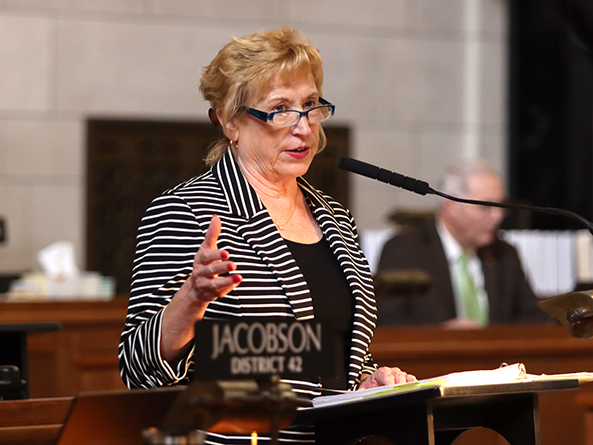Income tax package advances after cloture vote
Lawmakers gave first-round approval March 30 to a proposal that would cut Nebraska’s top individual and corporate income tax rates to just under 4 percent beginning with tax year 2027.

Senators passed a measure last session to cut the top individual income tax rate in several steps from the current 6.64 percent to 5.84 percent over the next four years. It will cut the top corporate rate from 7.25 percent to 5.84 percent.
LB754, as introduced by Elkhorn Sen. Lou Ann Linehan at the request of Gov. Jim Pillen, instead would cut both rates to 3.99 percent over the same time period.
Linehan said the change would help Nebraska compete with neighboring states — all of which have lower income tax rates or do not collect income taxes — when trying to attract businesses and workers.
“Bringing down our top rate is critical to the future of Nebraska,” she said.
A Revenue Committee amendment, adopted 41-1, replaced the bill with a modified version of LB754 as well as several other bills heard by the committee this session.
In addition to reducing the rate that applies to the top, or fourth, individual income tax bracket, the amendment incrementally would cut the rate on the third bracket from 5.01 percent to 3.99 percent beginning with tax year 2027. That rate applies to income between $18,000 and $28,999 for individual filers and between $36,000 and $57,999 for those married filing jointly.
The top individual rate applies to income of $29,000 and over for individual filers and $58,000 and over for those married filing jointly. The top corporate rate applies to all taxable income in excess of $100,000.
Sen. Robert Clements of Elmwood, chairperson of the Appropriations Committee, supported the rate reduction, saying state revenue will exceed spending by more than $1 billion this fiscal year.
“When we overcharge somebody in a business and figure it out, we give them back … what they had coming from their overpayment,” he said.
Also in support was Elkhorn Sen. R. Brad von Gillern. Although the rate cuts are intended to return surplus revenue to Nebraskans in the top income bracket — who von Gillern said are responsible for the bulk of that revenue — other provisions in the committee amendment would benefit those with lower incomes, he said.
The proposal is designed to help a “broad spectrum of taxpayers,” von Gillern said, and make Nebraska more appealing to young people and businesses when they are deciding where to locate.
“This is a serious competition between us and 49 other states,” he said, “and if we … don’t realize that, we’re going to be out of business as a state.”
Sen. George Dungan of Lincoln said the claim that people move to or leave a state because of its tax structure is not supported by data.
He and other lawmakers said they were concerned that the proposed tax cuts would not be sustainable. If revenue falls short in future years, Dungan said, lawmakers would have to choose between raising taxes and cutting services for residents.
“That’s a lose-lose situation for Nebraskans … and it’s a place that I don’t want to put us in,” he said.
Omaha Sen. John Cavanaugh said the proposal disproportionately would benefit wealthy Nebraskans. He introduced an amendment that would cut the top individual and corporate rates to 4.99 percent while decreasing the rate on the third individual income tax bracket and the lower corporate rate to 3.99 percent.
He said the amendment would give a “smaller but still substantial” tax break to those in the top bracket while providing a larger cut for middle income earners. Lawmakers could cut the top rate further next year if state revenue increases as projected, Cavanaugh said.
“There is a downturn coming,” he said, “and we need to be cautious about implementations of huge expenditures like this.”
The amendment failed on a vote of 8-32.
A similar amendment introduced by Dungan to cut the top rates to 5.84 percent by tax year 2024 failed on a vote of 6-29.
Additional measures
The committee amendment also includes the provisions of LB38, introduced by Sen. Carol Blood of Bellevue, which would allow federal retirees to exclude the amounts received as annuities under the Federal Employees Retirement System or the Civil Service Retirement System from their federal adjusted gross income.
Under the amended provisions of LB173, sponsored by Lincoln Sen. Eliot Bostar, income earned by a non-resident would not be subject to state income tax if the individual worked less than 15 days in Nebraska during the taxable year.
The provisions of LB492, introduced by von Gillern, would allow businesses to deduct the cost of certain property and research or experimental expenditures from their tax liability.
Von Gillern introduced an amendment to the committee amendment, adopted 40-1, to include the provisions of his LB206, which would allow partnerships to pay taxes owed on an amended return on behalf of the partners rather than requiring each partner to file an amended return.
Under the provisions of LB497, sponsored by Linehan, an individual who itemized deductions on his or her federal income tax return would be allowed to subtract from their federal AGI the standard deduction or the sum of their federal itemized deductions and the amount of state and local taxes they paid, whichever is greater.
The amended provisions of LB641, introduced by Sen. Kathleen Kauth of Omaha at the request of the governor, would exempt 100 percent of Nebraskans’ Social Security income from state income tax beginning in tax year 2024 rather than 2025.
Also included in the committee amendment are the amended provisions of LB318, also introduced by Bostar. They would allow individuals, estates, trusts and corporations to apply for a nonrefundable state income tax credit of up to $100,000 for qualifying contributions they make to eligible child care programs.
The state Department of Revenue could approve $10 million in credits under the program annually.
The proposal also would allow the department to approve up to $15 million each year in refundable income tax credits intended to help Nebraskans pay for child care. Parents or legal guardians could apply for a credit of $2,000 per child if their household income is no more than $75,000 and $1,000 per child if their household income is more than $75,000 but no more than $150,000.
Finally, Bostar’s proposal would amend the School Readiness Tax Credit Act to increase the amount of tax credits available for qualifying child care providers and employees.
Bostar said the measure would help child care providers remain viable and create an “extraordinary” benefit for Nebraska’s early childhood educators, approximately 30 percent of whom live in poverty.
Lincoln Sen. Danielle Conrad said the proposal is a “baby step” that would assist only 10,000 to 15,000 Nebraska families when hundreds of thousands of families need help with child care expenses.
Conrad suggested that lawmakers use the state’s “unprecedented” revenue surplus — which she attributed in large part to an influx of federal pandemic relief funds — to make LB754 more equitable. A more “robust” child tax credit like the one proposed in her LB294 along with an increase to the state’s earned income tax credit would benefit more middle class and low-income working families, she said.
After eight hours of general file debate over two days, Linehan filed a motion to invoke cloture, which ends debate and forces a vote on the bill and any pending amendments.
The motion succeeded on a vote of 41-0. Thirty-three votes were needed.
Senators then voted 41-0 to advance LB754 to select file.


